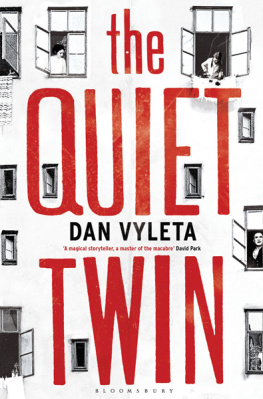This book has benefited immeasurably from the support, advice and expertise of a great number of people. Professor Gerhard Botz fed me schnitzel while fielding a hundred questions of mine until deep into the night. His answers were humbling in the depth of their historical insight; the books remaining mistakes are a symptom of my inability to formulate the right questions, rather than his inability to answer any of them. I heartily thank him for his friendship and guidance. Martin Herles and ofia Mrzov not only gave me food, wine and shelter when I was staying in Vienna, but also helped track down some very Viennese facts, as did Petra and Carolus Stigler. David Pasek counselled me on matters architectural; David Svoboda graciously provided me with some insight into neurological and psychiatric disorders; Michal Vyleta advised me on general medical matters; Ivan Crozier helped me when it came to reimagining medicine as it was practised at the end of the 1930s; Andrew Hamilton-Wright enlightened me on questions of acoustics. Boyd White was the first to hear me describe the opening chapter of the book and gave me an early thumbs-up; he and Richard Lapidus read drafts of the novel and shared their perceptions. I am very grateful to all of you.
I would also like to thank Helen Garnons-Williams and the team at Bloomsbury, whose enthusiasm carried me through the process of writing; Alex Schultz at HarperCollins Canada for his diligence, sensitivity and tact, and my agent, Simon Lipskar, who has never faltered in his support of the Czech-German-Canadian oddball whose first manuscript he pulled out of the slush pile.
Above all, I wish to thank my wife, Chantal, The Quiet Twin s first reader. Writing a novel is an act of faith; mine was rooted in her love.
And I will take a further secret to the grave: that I once observed Mother, how she secretly went into the cellar larder, cut herself a thick slice of ham and ate it downstairs, standing up, with her hands, hurriedly, it didnt even look repulsive, just surprising, I was more touched than appalled. [...] Curiously enough, I like those of whose kind I am: human beings.
Heinrich Bll, A Clowns Perspectives
Writing a book of fiction that is set in the past means entering into an awkward and often rather dysfunctional dialogue: between what was and what might have been; between the demands of veracity and the lure of drama; between the representative and the remarkable; between the grind of research and frenzied inspiration. For all the inaccuracies that litter the book, it was motivated by an earnest attempt to understand what it meant to live in the period and place I was writing about, and it is to this, the experience of my cast of ordinary Austrians, rather than to any specific body of facts that I attempted to be faithful. I can make no claim that I understand National Socialism. That would mean that I understand how a society could have produced camps designed to exterminate those who used to be neighbours, colleagues, teachers, doctors, plumbers, violinists. It seems important, however, to struggle towards understanding, which for me began with picturing a block of flats, filled with neighbours, colleagues, teachers, doctors, plumbers, violinists.
The story of The Quiet Twin is set in October and early November 1939. The book does not attempt to provide a precise account of these weeks and months. I have taken certain liberties with the weather, have ignored some key events such as the commencement of deportations of Jewish men, and introduced a spree of killings that has no precise equivalent in fact (even though a number of sensational murders did take place between April and September of that year). There are inaccuracies and slight anachronisms in my allusions to the procedures and pace of Austrian mobilisation. Thomas Manns attendance of a spiritistic seance took place some six or seven years prior to the point indicated in the novel (and not in Vienna), though other details are correct. The italicised sections that separate the various chapters are, with minor exceptions, accurate in their details. Some things, as the saying goes, are too strange to have been made up.
The secret murder of psychiatric patients and the physically handicapped known under the Nazi cypher T4 did not commence in earnest until the spring of 1940. It might be argued, therefore, that some of Anton Beers and Otto Freis worries are not only premature but anachronistic. The chief point, however, is that nothing was known for certain, least of all the timetable of mass murder. Beer, working in a psychiatric ward where the spirit of National Socialist medicine was gaining ground, and Otto, witnessing the aggressive circulation of propaganda that sought to prejudice the population against the sick, might be forgiven for anticipating the implementation of the regimes homicidal policies. Forced sterilisations had long been taking place throughout the Reich.
The part of Vienna where the book is set has undergone significant architectural changes since the Second World War; the group of buildings I describe does not exist in this precise constellation. Even in the 1930s, courtyard workshops like Pollaks auto-repair shop were more typical of the second district, where they can be found to this day. The inhabitants of Viennas apartment buildings often did display a startling sociological diversity; rich and (working) poor often lived in a proximity that would be highly unusual in modern-day Britain, the USA, or Canada, though somewhat less so in the cities of Central Europe. Windows that opened to the main street rather than the yard typically indicated more desirable living spaces.
One aspect of the specifically Austrian experience of National Socialism that the book fails to explore is the Austrofascist regime that ruled the country in the years immediately prior to Austrias annexation by the German Reich. Some oblique reference to this fact is made by Teuben who indicates that some of Specksteins authority derives from the fact that his membership of the Party dates from the years when it was declared illegal by the Austrofascist regime. I am hoping to address this theme in a future book.
All characters in this book are free inventions, which is to say an amalgam of figures I have met in my research and in real life, reimagined into the context of the story I was telling. Many of them are perfectly ordinary figures, though I have tried to resist the temptation to make them so ordinary as to reduce them to types: neither Beer, nor Zuzka, nor the drunken, nameless janitor are meant to represent anyone but themselves. If I have eschewed depicting the spiritual life of a dyed-in-the-wool Nazi ideologue, this should not be taken to imply that such people did not exist in 1930s Austria. My primary interest in this book belonged with the army of opportunists whose crimes were at times as grave in their consequences as those perpetrated by the true believers. Sixty-five years after the Second World War it is easy for most of us to convince ourselves that we could never have belonged amongst those who would have held wrong-headed beliefs; it is a more nagging question to wonder what one might have done in order to secure some modicum of social and material success.
As both Beer and Teuben remark, Speckstein is an unusual figure, and bears a somewhat unusual name. The question of how he, the disgraced Professor with aristocratic pretensions and Hapsburg nostalgia, a person, in short, who might as easily have been found amongst the (conservative, Christian, Austrofascist or Monarchistic) enemies of National Socialism as amongst its ranks, ended up as a low-level functionary within the Party, will have to remain the subject of a separate narrative; it is not, however, a story that is any less plausible than any number of biographies of actual Party members who achieved a much higher rank than my fictional Zellenwart . It remains unclear to me whether the past is better explored through representative figures or through those whose choices and fate surprise.
Next page










![Randy Mosher - Beer for all seasons : [a through-the-year guide to what to drink and when to drink it]](/uploads/posts/book/74958/thumbs/randy-mosher-beer-for-all-seasons-a.jpg)

